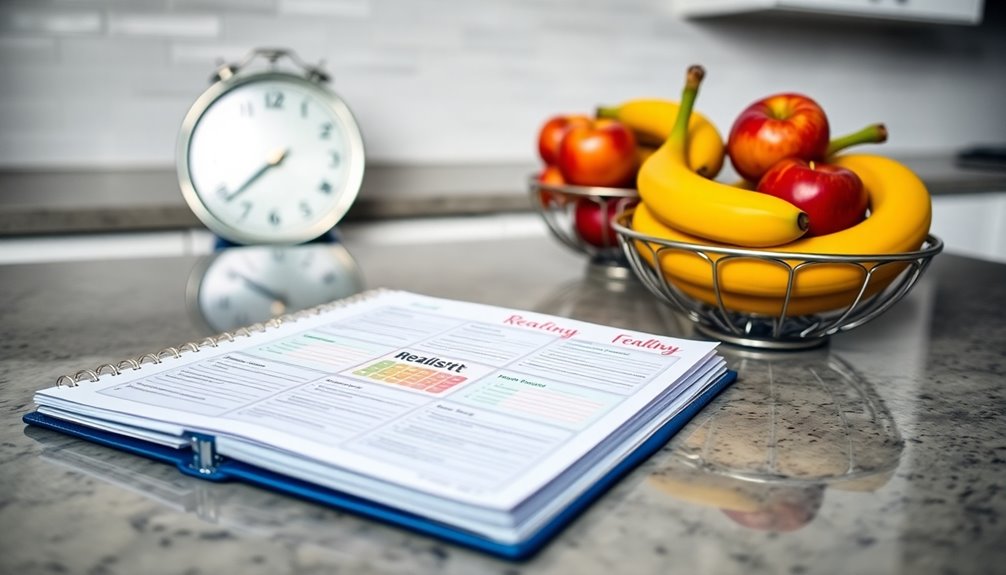To break through a weight loss plateau, start by evaluating your current diet and adjusting your calorie intake. Make sure you're balancing nutrients and practicing portion control. Next, mix up your exercise routine—vary the intensity and try new activities, especially strength training, to boost metabolism. Don't underestimate the importance of quality sleep and hydration; both contribute to your overall progress. Keep stress in check and set realistic goals to stay motivated. By monitoring these factors closely, you'll reignite your weight loss journey. Discover effective strategies to tackle each of these areas and take your progress to the next level!
Key Takeaways
- Adjust your calorie intake by reassessing portion sizes and ensuring a balanced diet to overcome metabolic adaptation.
- Incorporate strength training and resistance exercises to increase muscle mass, which can boost metabolism and aid weight loss.
- Change your exercise routine by varying intensity and trying new activities to challenge your body and stimulate progress.
- Monitor stress levels and prioritize quality sleep, as both are crucial for maintaining a healthy metabolism and supporting weight loss efforts.
- Utilize tools like the Adaptive Body Boost program for personalized guidance and to stay motivated during your weight loss journey.
Understanding Weight Loss Plateaus

When you're on a weight loss journey, hitting a plateau can feel frustrating and discouraging. You might be putting in the same effort as before, yet the scale refuses to budge. Understanding the causes behind these plateaus is crucial for overcoming obstacles and reigniting your progress.
One common cause of a weight loss plateau is metabolic adaptation. As you lose weight, your body requires fewer calories to maintain its new size. This means that your previous calorie deficit may no longer be effective, leading to stagnation.
Additionally, lifestyle factors such as stress, sleep quality, and exercise routine can play meaningful roles. If you've been following the same workout regimen for a while, your body may have adapted, making it less effective for continued weight loss.
Another factor to keep in mind is potential muscle loss during weight loss. If you're not incorporating strength training, you may be losing muscle mass along with fat, which can slow down your metabolism.
To break through these plateaus, it's crucial to be proactive. Reflect on mixing up your workout routine or adjusting your calorie intake. Focus on getting enough sleep and managing stress, as these elements can influence your weight loss journey significantly. Incorporating a comprehensive program like the Adaptive Body Boost can provide additional guidance and support to help you overcome these challenges.
Evaluate Your Current Diet

Evaluating your current diet can be a game changer in overcoming a weight loss plateau. You might be surprised to discover that small tweaks can lead to significant changes in your progress. Start by gauging your nutrient balance. Are you getting a good mix of carbohydrates, proteins, and fats? Each macronutrient plays an essential role in your body's functioning and weight loss journey. Aim for a balanced plate that includes whole grains, lean proteins, healthy fats, and plenty of fruits and vegetables. This way, you're not just cutting calories but also fueling your body with necessary nutrients.
Next, let's talk about portion control. Even healthy foods can contribute to weight gain if you're not mindful of how much you're eating. Consider using smaller plates or measuring your portions to help estimate your intake more accurately. It's easy to underestimate how much you're consuming when you're not paying attention.
Another helpful strategy is to keep a food journal. Tracking what you eat can reveal patterns or hidden calories that might be hindering you. It's a supportive way to take charge of your eating habits and see where adjustments can be made. Additionally, utilizing progress tracking tools can provide valuable insights into your dietary habits and help you stay accountable.
Adjust Your Exercise Routine

After reassessing your diet, it's time to turn your attention to your exercise routine. Sticking to the same workout can lead to a weight loss plateau, so mixing things up is essential. One effective strategy is to incorporate intensity variation into your workouts. This means alternating between high-intensity bursts and lower-intensity recovery periods. Studies have shown that this approach not only boosts calorie burn but can also enhance your cardiovascular fitness, making your workouts more crucial.
Additionally, achieving a cardio balance is vital. Many people focus solely on cardio exercises, but it's important to vary the types of cardio you include. Try integrating steady-state cardio, like jogging, with interval training, which alternates between high and moderate intensities. This combination can help break through plateaus by challenging your body in new ways.
Consider trying different activities, too—cycling, swimming, or group classes can introduce fresh challenges and keep you motivated. It's also beneficial to listen to your body; if you feel fatigued, don't hesitate to adjust your routine to allow for recovery. Using tools like mini bands can add a unique challenge and help in muscle toning as you adjust your routine.
Connecting with others who share similar goals can provide additional support and encouragement as you navigate these changes. Remember, you're not alone in this journey. By adjusting your exercise routine through intensity variation and achieving a cardio balance, you can reignite your weight loss progress and continue moving toward your goals.
Incorporate Strength Training

Incorporating strength training into your exercise routine is a powerful way to break through a weight loss plateau. When you engage in resistance training, you're not just burning calories during your workouts but also building muscle. Increased muscle mass elevates your resting metabolic rate, meaning your body burns more calories even when you're at rest. This helps reignite your weight loss journey.
You might feel intimidated by the thought of lifting weights, but remember, everyone starts somewhere. Begin with bodyweight exercises, like push-ups or squats, and gradually progress to using dumbbells or resistance bands. Aim for at least two to three sessions of strength training each week, focusing on all major muscle groups. Consistency is key!
Research shows that strength training can enhance your overall fitness, improve body composition, and support sustainable weight loss. Plus, it strengthens bones, boosts mood, and builds confidence. You're not just working on your body; you're fostering a sense of belonging to a community that values health and wellness. Additionally, incorporating glute-specific movements can significantly impact your overall strength and athletic performance.
Consider joining a local class or finding a workout buddy. This can provide motivation and make the process enjoyable. Share your progress with friends or on social media; you'll find encouragement and camaraderie along the way. Remember, every small step counts, and with strength training, you're equipping yourself with the tools you need to overcome that plateau and achieve your goals. Embrace the journey; you're not alone in this!
Monitor Your Stress Levels

Stress management is necessary for overcoming a weight loss plateau. When you experience stress, your body releases hormones like cortisol, which can disrupt hormonal balance and lead to weight gain or hinder your progress. It's important to recognize the impact stress can have on your body and mind, especially when you're working hard to achieve your weight loss goals.
Start by monitoring your stress levels. You mightn't realize how daily pressures, whether from work, relationships, or other responsibilities, can accumulate and affect your well-being. Consider keeping a journal to track your stress triggers and responses. This awareness can empower you to take proactive steps.
Incorporating stress-reduction techniques can be transformative. Activities like yoga, meditation, or even just a daily walk can help you unwind. These practices not only lower stress but also promote hormonal balance, enabling your body to function at its best. Remember, it's okay to ask for support from friends, family, or professionals. Sharing your experiences can foster a sense of community and belonging, which is essential during challenging times. Additionally, managing stress effectively is crucial in preventing CKD progression, as chronic stress can contribute to underlying health conditions that affect kidney function.
Lastly, make sure to set aside time for self-care. Prioritizing activities that bring you joy and relaxation can greatly improve your overall well-being. By managing your stress effectively, you'll not only break through that plateau but also create a healthier, more balanced lifestyle. Embrace this journey, knowing that you're not alone in facing these challenges.
Prioritize Quality Sleep

Quality sleep is vital for breaking through a weight loss plateau and enhancing your overall health. When you prioritize quality sleep, you support your body's metabolic functions, hormone regulation, and recovery processes. It's not just about the hours you spend in bed; it's about the quality of that sleep. Poor sleep hygiene can lead to increased cravings and weight gain, making it essential to adopt habits that promote restorative rest.
Start by establishing a consistent sleep schedule. Going to bed and waking up at the same time each day helps regulate your internal clock, making it easier to fall asleep and wake up feeling refreshed. Aim for 7-9 hours of quality sleep each night.
Create a calming bedtime routine that signals your body it's time to unwind. This could include dimming the lights, reading a book, or practicing relaxation techniques. Avoid screens and bright lights at least an hour before bed, as they can interfere with melatonin production.
Additionally, consider your sleep environment. A cool, dark, and quiet room contributes to better sleep quality. Investing in a comfortable mattress and pillows can make a significant difference. Moreover, practicing deep breathing exercises before bedtime can further enhance relaxation and prepare your body for restorative sleep.
Stay Hydrated

Staying well-hydrated is a key factor in overcoming a weight loss plateau and maintaining overall well-being. When you maximize adequate water intake, you not only support your body's essential functions but also enhance your weight loss efforts. Hydration benefits include improved metabolism, better digestion, and reduced cravings, all crucial in breaking through those stubborn plateaus.
Here's a quick look at the hydration benefits and tips to boost your water intake:
| Hydration Advantages | Strategies to Increase Water Intake |
|---|---|
| Enhances metabolism | Carry a reusable water bottle |
| Curbs hunger | Set reminders to drink regularly |
| Elevates exercise performance | Flavor water with fruits or herbs |
| Improves nutrient absorption | Drink a glass before meals |
| Supports detoxification | Replace sugary drinks with water |
You might not realize it, but even slight dehydration can impact your energy levels and focus. By maintaining your water intake up, you help your body function at its best, which can lead to better workouts and healthier choices. Aim for at least 8 cups of water a day, adjusting based on your activity level and climate. Additionally, optimizing your oxygen intake can further enhance your weight loss efforts, making hydration even more effective.
Seek Professional Guidance

Many people find that seeking professional guidance can be a game-changer when trying to break through a weight loss plateau. Engaging with a qualified fitness coach or nutrition counselor can provide you with the personalized support and expertise you need to move forward. These professionals can assess your current routines, identify any areas for improvement, and help you create a tailored plan that aligns with your unique goals.
A fitness coach can offer insight into effective workout strategies that keep you motivated and challenged. They can help you vary your exercise routine to prevent your body from adapting, which is often a key reason for plateaus. With their guidance, you'll learn how to integrate new exercises that not only burn calories but also enhance your overall strength and endurance.
On the nutrition side, nutrition counseling can be invaluable. A nutrition counselor will analyze your eating habits and nutritional intake, helping you uncover hidden obstacles that may be hindering your progress. They can educate you on portion control, meal timing, and the importance of nutrient-dense foods, ensuring your diet supports your weight loss goals. Additionally, research from the Garvan Institute of Medical Research(https://www.garvan.org.au/) highlights how personalized nutrition plans can lead to better management of metabolic conditions like diabetes, which may influence weight loss success.
Set Realistic Goals

Setting realistic goals is essential for overcoming a weight loss plateau and maintaining motivation. When you set achievable goals, it becomes easier to stay committed and see tangible results. Instead of aiming for substantial weight loss, focus on smaller, incremental changes that promote a sustainable lifestyle.
Here's a handy table to help you differentiate between realistic and unrealistic goals:
| Realistic Goals | Unrealistic Goals |
|---|---|
| Lose 1-2 pounds per week | Lose 10 pounds in one week |
| Exercise 3-4 times a week | Work out every day for 2 hours |
| Incorporate healthy snacks daily | Eliminate all favorite foods forever |
Incorporating goal setting into your routine can notably enhance your progress tracking. Keep a journal or use a mobile app to document your achievements. This not only provides a sense of accomplishment but also highlights areas needing improvement. Additionally, adopting a plant-based diet can support your weight loss journey by promoting a healthier lifestyle and enhancing your overall well-being.
Frequently Asked Questions
Can Age Affect My Ability to Break a Weight Loss Plateau?
Yes, age can affect your ability to break a weight loss plateau. As you get older, your metabolism changes, often slowing down, making it harder to burn calories.
Additionally, hormonal shifts can play a significant role, impacting how your body stores fat and regulates hunger. Understanding these changes can empower you to adjust your approach, whether it's through diet, exercise, or lifestyle modifications, helping you regain momentum on your weight loss journey.
How Long Can a Weight Loss Plateau Last?
A weight loss plateau can last anywhere from a few weeks to several months, but don't let that discourage you. It's often a sign your body needs a mindset shift.
You might need to reassess your exercise routine, perhaps by increasing intensity or trying new activities. Remember, progress isn't always linear.
Stay committed, connect with others on similar journeys, and trust that your efforts will eventually pay off. You're not alone in this!
Are There Specific Foods That Can Help Overcome a Plateau?
Specific foods can indeed help you overcome a plateau by supporting meal timing and hormone balance. Incorporate protein-rich foods like lean meats and legumes to promote satiety and muscle repair. Healthy fats from sources like avocados and nuts can stabilize your hormones, aiding overall metabolism. Whole grains and fiber-rich vegetables keep your energy levels steady, preventing cravings. Remember, it's about creating a sustainable approach that fits your lifestyle and keeps you feeling empowered.
Is It Normal to Regain Weight After Breaking a Plateau?
It's like climbing a mountain; sometimes, you might slip back down a bit after reaching a peak. Yes, it's normal to regain some weight after breaking a plateau. Weight maintenance can be tricky, especially when lifestyle changes are involved. Your body's adjusting, and it needs time to find its new balance.
Embrace this journey, and remember, it's part of the process. You're not alone in this; others face similar challenges too.
Can Supplements Aid in Breaking Through a Weight Loss Plateau?
Supplements can potentially aid in breaking through a weight loss plateau, but their effectiveness varies. Some studies suggest certain supplements might boost metabolism or enhance fat oxidation, which could help you regain momentum. However, relying solely on them isn't a long-term solution.
Instead, focus on a balanced diet and regular exercise for plateau prevention. Combining these strategies with supplements can create a holistic approach to support your journey and foster a sense of community.
Conclusion
Breaking through a weight loss plateau can feel like running in place on a treadmill—you're putting in the effort, but not moving forward. Remember, just as a runner needs to adjust their pace or route to keep progressing, you may need to tweak your diet or exercise. By staying committed and making small changes, you can reignite your journey. Embrace the process, and soon you'll find yourself crossing that finish line, one step at a time.



